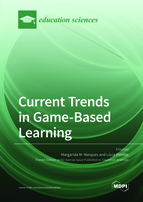Current Trends in Game-Based Learning
A special issue of Education Sciences (ISSN 2227-7102).
Deadline for manuscript submissions: closed (15 August 2021) | Viewed by 32934
Special Issue Editors
Interests: innovation in Science Education, specifically technology supported Education (e.g., by mobile devices and augmented reality) and game-based learning; scientific literacy and teacher professional development
Interests: mobile technologies in education, namely learning enhanced by mobile devices, augment reality and gamification, and teaching methodology in Science Education in formal, non-formal and informal contexts
Special Issue Information
Dear Colleagues,
The potential of digital games to promote learning is a growing field of research. Researchers have been extensively analyzing the impact of games on learner motivation and engagement in educational settings [1] and even reporting the contribution of this approach to a diversity of learning outcomes, such as concept understanding [2], [3] and soft skills development [4].
A myriad of technologies can be used to support digital game-based learning; however, this Special Issue of Educational Science focuses on game-based learning supported by mobile devices, a technology with a high penetration rate in our societies, even among the young population. The aim is to collect a set of strong contributions presenting new knowledge on the design, development, implementation, monitoring, and efficacy assessment of game-based learning mobile environments, to promote best practices and the integration of mobile educational games in educational settings.
Recommended topics include, but are not limited to, the following:
- Design and development of mobile game-based learning
- Efficacy assessment and quality issues in mobile game-based learning
- Pedagogical models and learning theories in mobile game-based learning
- Teacher acceptance and adoption of mobile game-based learning
- Integration of augmented reality or virtual reality in mobile game-based learning
- Mobile game-based learning in educational settings: formal (K-12, higher education, continuing education, special education, teacher education), non-formal, and informal education; face-to-face, blended and distance education
We welcome the submission of original and unpublished works reporting the latest empirical research findings, relevant theoretical frameworks, and well-structured literature review articles.
Dr. Margarida Morais Marques
Dr. Lúcia Pombo
Guest Editors
References:
[1] L. Shu and M. Liu, “Student Engagement in Game-Based Learning: A Literature Review from 2008 to 2018,” J. Educ. Multimed. Hypermedia, vol. 28, no. 2, pp. 193–215, 2019.
[2] Y.-L. Huang, D.-F. Chang, and B. Wu, “Mobile Game-Based Learning with a Mobile App: Motivational Effects and Learning Performance,” J. Adv. Comput. Intell. Intell. Informatics, vol. 21, no. 6, pp. 963–970, Oct. 2017.
[3] L. Pombo and M. M. Marques, “Improving students’ learning with a mobile augmented reality approach – the EduPARK game,” Interact. Technol. Smart Educ., vol. 16, no. 4, pp. 392–406, Nov. 2019.
[4] S. Kailani, R. Newton, and S. Pedersen, “Game-Based Learning and Problem-solving Skills: A Systematic Review of the Literature,” in Proceedings of EdMedia + Innovate Learning, 2019, pp. 1127–1137.
Manuscript Submission Information
Manuscripts should be submitted online at www.mdpi.com by registering and logging in to this website. Once you are registered, click here to go to the submission form. Manuscripts can be submitted until the deadline. All submissions that pass pre-check are peer-reviewed. Accepted papers will be published continuously in the journal (as soon as accepted) and will be listed together on the special issue website. Research articles, review articles as well as short communications are invited. For planned papers, a title and short abstract (about 100 words) can be sent to the Editorial Office for announcement on this website.
Submitted manuscripts should not have been published previously, nor be under consideration for publication elsewhere (except conference proceedings papers). All manuscripts are thoroughly refereed through a double-blind peer-review process. A guide for authors and other relevant information for submission of manuscripts is available on the Instructions for Authors page. Education Sciences is an international peer-reviewed open access monthly journal published by MDPI.
Please visit the Instructions for Authors page before submitting a manuscript. The Article Processing Charge (APC) for publication in this open access journal is 1800 CHF (Swiss Francs). Submitted papers should be well formatted and use good English. Authors may use MDPI's English editing service prior to publication or during author revisions.
Keywords
- Game-based learning
- Mobile technology
- Pedagogical models
- Learning theories
- Teacher acceptance and training
- Educational augmented reality
- Educational virtual reality







